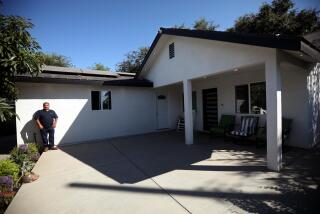Titleholders want to abandon developer-controlled association
- Share via
Question: A majority of titleholders want to abandon our present homeowners association. Several thousand homes were to be built in our new subdivision, but fewer than 60 have been purchased. There were supposed to be five phases, but the builder stopped at phase one and won’t finish the development. When we purchased our homes, we asked to see the association’s governing documents, rules and covenants, conditions and restrictions; nothing made sense to us. Had we understood what a developer-controlled association meant, most of us would not have purchased our homes here. Recently we received notice of a dues increase and were told part of it is retroactive to April 1, 2012. We are being charged for many common area things that the association is not taking care of. Only management company and developer employees sit on the board of directors and none own property here. We don’t know what’s going on because the board is non-responsive. Does the board have a legal right to keep increasing dues?
Answer: This is a terrible situation with little viable redress for owners. While developers must still follow the law, a developer-controlled board differs from a duly elected board of directors. The developer is the owner of the various separate interests, and if the developer has not yet turned the association over to the owners, the developer rules the roost, so to speak. Often a developer-controlled association may initially keep fees and costs artificially low to entice sales. Many times, once the sales are accomplished, or the developer pulls out, owners watch costs skyrocket, then scramble to raise enough money to stay solvent.
Generally, individual titleholders cannot unilaterally withdraw from the association, but can sell and move out. Separation from the homeowners association can occur if one of the conditions in Civil Code section 1359 is met. Those include damage or destruction occurring more than three years before an action to partition the project; destruction of three-fourths or more of the project and more than 50% of the owners oppose repair or restoration; the project is more than 50 years old, is obsolete and uneconomical and more than 50% of the owners oppose repair or restoration of the project, and/or the conditions for such a sale, set forth in the declaration, have been met.
It is possible that a court might find that construction of only 60 homes “out of thousands that were to be built” constitutes “destruction” in a sense of three-fourths or more of the project. It then becomes incumbent upon a titleholder to ensure that at least 50% of the owners oppose restoration or continued construction.
If the covenants, conditions and restrictions or other governing documents provide a set of circumstances under which the project may be partitioned or sold, and those conditions have been satisfied, then dissolution may occur, allowing homeowners to withdraw from the association. However, rarely do such documents allow owners to withdraw from the association. In addition, these actions are costly and may involve a court order.
Dues increases cannot typically be made retroactive, at least as far as elected boards are concerned. But this is a developer-controlled board and developers may have rights that owners don’t. If action is taken in violation of the law or governing documents, owners should consider legal action against the developer.
Any board is required to follow corporate governance law and must still give four days notice of any director meetings unless the date of the meetings are included in the association’s bylaws. Boards must still take minutes, including documenting all motions and board votes, and must make those minutes available within 30 days upon the request of any titleholder.
Regardless of who sits on the board, developer or owners, there exists a basic fiduciary duty to act in good faith and in the best interests of the association and its titleholders. Typically, if the association is collecting dues from the titleholders, the developer is also obligated by law to pay dues for the units it still owns and has not been able to sell according to 10 Cal Admin. Code section 2792.16(c).
Zachary Levine, partner at Wolk & Levine, a business and intellectual property law firm, co-wrote this column. Vanitzian is an arbitrator and mediator. Send questions to Donie Vanitzian JD, P.O. Box 10490, Marina del Rey, CA 90295 or noexit@mindspring.com.
More to Read
Sign up for Essential California
The most important California stories and recommendations in your inbox every morning.
You may occasionally receive promotional content from the Los Angeles Times.






